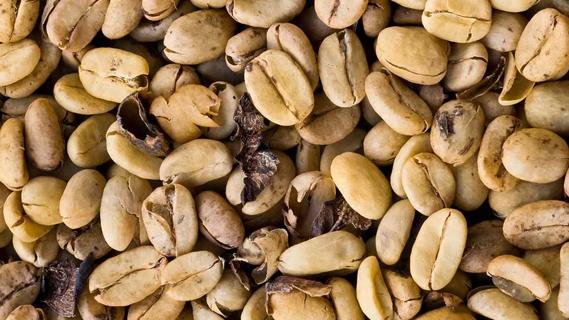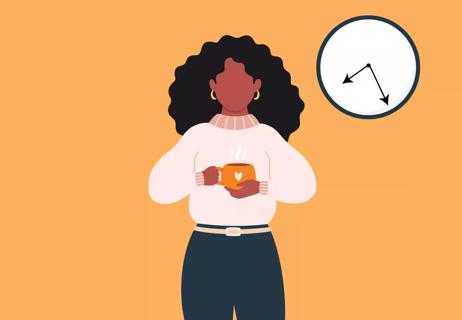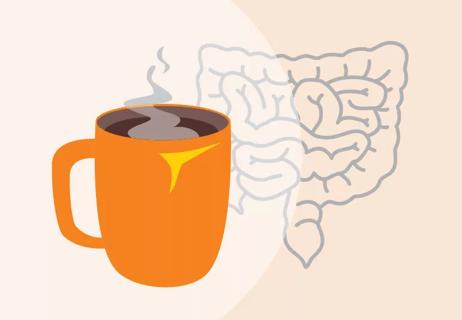Along with boosting your energy, a moderate amount of coffee can help lower your risk of Type 2 diabetes, liver disease and certain cancers

Some days (most days, honestly) coffee can feel like the glue that’s holding it all together. It can turn you from zombie to human in the morning. It can give you a nice afternoon pick-me-up. And it can help keep you moving all those hours in between.
Advertisement
Cleveland Clinic is a non-profit academic medical center. Advertising on our site helps support our mission. We do not endorse non-Cleveland Clinic products or services. Policy
But — deep breath — is coffee good for you?
You can exhale. Coffee, it turns out, packs some surprising health benefits.
“There aren’t a lot of downsides to drinking moderate amounts of coffee — and, in fact, it can have positive effects on your health,” says registered dietitian Devon Peart, RD, MHSc.
You probably don’t need another reason to pour yourself a fresh cup. But just in case, keep reading. (Go ahead and refresh your mug first if you’d like, we can wait a minute…)
Peart says that when combined, the various ingredients in coffee add up to a drink that’s greater than the sum of its parts. And while how much coffee you drink and how you take it will make a difference in its health benefits, your cup of joe can do your body good in several ways.
Many of us are familiar with the main “pro” of coffee. The kick you get from your morning coffee is thanks to caffeine, a natural stimulant that can make you feel more energetic.
While it can get a bad rap (if you overdo it), it turns out that the caffeine in coffee does more than just wake you up. It acts on your brain to improve memory, mood, reaction times and mental function. One study from 2004 even says caffeine can improve endurance and performance during exercise.
Advertisement
While it’s not a huge amount, a cup of black coffee provides some nutrients.
“Coffee contains about a thousand different botanical compounds,” Peart points out. Scientists haven’t studied all of them well, but the news so far gets two thumbs up.
Coffee comes from beans, after all. And as Peart says, “Dietitians love beans. ”It also helps that it’s low in calories, free of cholesterol and has no sugar (unless you add some flavorings, of course).
More specifically, coffee includes these nutrients:
Coffee beans are also rich in antioxidants, which are compounds that protect cells against damage.
But there’s more to it than that. “The latest research shows that it’s not the antioxidants, per se, that make coffee beneficial. It’s actually the phenolic compounds,” shares Peart.
Phenolic compounds, or phenols, are substances found in plant foods that play a key role in your body’s defense systems, protecting it from oxidative stress, as well as inflammation.
A 2020 study shows that the phenolic components in coffee provide health-promoting effects like those in vegetables or fruits. “Remember that coffee is made from beans, a plant food,” she reminds us.
Multiple studies show that regular coffee consumption lowers the odds of developing diabetes. A 2009 review found that consuming coffee (even decaf) and tea can lower your risk of Type 2 diabetes.
A cup of coffee a day may help with your brain health as well. A 2010 review found studies that linked regular daily caffeine intake with a lower risk of developing Alzheimer’s disease and Parkinson’s disease.
Coffee has been shown to be a positive for your liver health. A 2006 study found that coffee can protect against cirrhosis of the liver. This was especially true for the people at high risk of the disease, such as those with alcohol use disorder or fatty liver disease.
Researchers have found that coffee drinkers have a lower risk of certain cancers. A 2007 review shows support for coffee reducing the risk of liver cancer among people with and without a history of liver issues. More recently, a 2023 review also compiled a series of studies that connected coffee consumption with a reduced risk for colorectal (colon) cancer.
That pick-me-up you get from a foamy cappuccino may not be a figment of your imagination. A meta-analysis from 2015 found multiple studies that connected higher coffee intake with a lower risk of depression.
Advertisement
And in 2023, a study found that two to three cups of unsweetened coffee a day may lower your risk for depression and anxiety.
Although there’s not enough evidence to support prescribing coffee to lower your risk of heart disease, this recent revelation may indicate that coffee is good for heart health.
A 2023 review found that consuming a moderate amount of coffee may lead to a decrease in heart issues like hypertension, high cholesterol and heart failure. While the reason isn’t clear, one possibility is that coffee helps improve blood vessels’ control over blood flow and blood pressure.
Good news for those of us sitting at our desks eight hours a day with a cup of coffee. A study from 2024 found another possible benefit of coffee — it may be able to soften the side effects of sitting all day. When researchers looked at those working six hours or more a day, they found that coffee drinkers had less risk of chronic diseases than non-coffee drinkers.
Of course, your cup of joe alone won’t keep your body healthy. Medical experts recommend you include a good amount of movement every day.
Coffee may be a healthy little bean, but it isn’t a magical one. To get more pros and fewer cons, Peart suggests following some guidelines.
Advertisement
Notice that we’ve used the word “moderate” a few times in this article. Excessive caffeine can cause dehydration. But it’s worth noting that a moderate amount of coffee isn’t dehydrating, contrary to popular opinion.
“At modest levels of intake, coffee is a net positive in terms of hydration, meaning it still contributes to your fluid needs,” Peart clarifies.
Coffee can also impact your blood pressure if you have too much of it. She adds that people are genetically predisposed to be slow or fast metabolizers of caffeine, and slow metabolizers may experience negative effects, such as elevated blood pressure, even at low levels of intake.
So, how much is too much? For the general population, experts recommend sticking to less than 400 milligrams (mg) of caffeine per day. An 8-ounce cup of coffee typically has 80 to 100 mg of caffeine. So, cap it at three to four small cups a day, max — no venti-sized!
If you’re pregnant, you may wonder if coffee is a no-no drink. According to the American College of Obstetricians and Gynecologists, it’s safe to have up to 200 mg of caffeine per day, or about two small cups, while pregnant. The jury is still out on whether higher caffeine intake poses any risks during pregnancy.
Advertisement
Some may find that caffeine makes them jittery or anxious. This, too, says Peart, depends on your genes. “Coffee makes some people anxious or jittery, regardless of the time of day,” she explains. “If that’s you, then you should avoid coffee or stick to an amount that doesn’t bring on symptoms.”
In addition, too much caffeine in your system can interfere with a good night’s sleep, especially if you drink it late in the day. The caffeine you consume can stay in your system for several hours after your last sip.
So, a late-afternoon latte or post-dinner café au lait may leave you tossing and turning at night. And sleep deprivation is nothing to mess with. To play it safe, stick to decaf in the evening.
One sugar or two? According to Peart, less is more. Coffee — particularly the concoctions you get at a coffee shop — can go hand-in-hand with less nutritious additions. (Think sweet-flavored syrups, sugar, whipped cream and so on.)
“Coffee may be relatively healthy, but what you add to it often isn’t,” she cautions. Keep an eye on the sugar and saturated fat, especially if you’re drinking multiple mugs a day.
Is it better to opt for an artificial sweetener over sugar?
“The research around artificial sweeteners is somewhat mixed,” Peart notes. “Artificial sweeteners are regulated, in terms of how much can be added to food, but no one is regulating how much sweetener you have in a day from different sources, so you could still get an unsafe amount.
“Over time, research shows that artificial sweeteners can train your brain to want more sweetness,” she continues, “because sweeteners taste much sweeter than sugar.”
Peart offers these tips for getting the most health benefits from your coffee, without the additions:
Want to give your coffee a real boost? Spices aren’t just a great way to add flavor to coffee. They can also provide surprising health benefits.
Many of us depend on (at least) one cup of coffee a day to get our engines running. Along with giving you a boost of energy, a simple cup of black coffee includes other benefits like fighting against inflammation and lowering your risk for chronic disease.
But it’s all about balance. So, listen to your body. Don’t overdo it if you’re feeling jittery from the caffeine, steer clear of a steaming mug-full before bed, and if you don’t take your coffee black, opt for non- or natural sugar and low-fat milk add-ons.

Sign up for our Health Essentials emails for expert guidance on nutrition, fitness, sleep, skin care and more.
Learn more about our editorial process.
Advertisement

The caffeine and natural acids in coffee may trigger acid reflux, but there are ways to lessen the effects

That cup of joe may help decrease inflammation and remove damaged cells in the vital organ

Coffee is made up of mostly water, but it’s the caffeine you have to look out for

There’s no evidence to prove this supplement can help with weight loss, and it may come with risks

Morning, noon or night — the best time for that cup of joe depends on you

Depending on your sensitivity to caffeine, a late-night cup may be just fine

It’s fine for most, but it can worsen heartburn and ulcers if you’re prone to them

Coffee is better (and safer) ingested than injected

Even small moments of time outdoors can help reduce stress, boost mood and restore a sense of calm

A correct prescription helps your eyes see clearly — but as natural changes occur, you may need stronger or different eyeglasses

Both are medical emergencies, but they are very distinct events with different causes